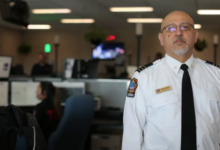Witnesses of Montreal Marathon runner’s collapse challenge emergency response time
An ambulance was requested at least four times before an emergency team arrived about 25 minutes after a participant in Montreal’s half-marathon event collapsed and later died, sources tell Radio-Canada.
Quebec’s coroner’s office has launched an investigation into the death of 24-year-old Patrick Neely, who collapsed about two kilometres from the finish line Sunday.
A police officer on the scene called three different times on her radio asking for an ambulance, and her partner called a fourth time before help came, according to Radio-Canada sources.
Watching from the sidelines, Josée Gagnon was one of the first to rush to Neely’s side, offering him water and comfort until, finally, an ambulance arrived.
She said others, including a nurse, performed CPR on Neely while waiting for the ambulance.
By looking over her phone’s history, she discovered exactly how much time had passed.
“I wondered if it was me who had lost track of time and that it had just taken four minutes. But that’s not it. Finally, it was 25 minutes. It was not in my head,” she said.
“Why was the first call was not heard?”
25-minute response time
Watching Neely turn blue with people crowding around, Gagnon eventually called 911 to ask what was taking so long, and the operator told her they had not yet received any calls about the incident.
Radio-Canada has since learned that runner collapsed at 9:38 a.m.
Urgences-santé says they received the call just before 9:56 a.m., 18 minutes later. The ambulance then arrived eight minutes later — 25 minutes in total.
Urgences-santé spokesperson Véronique Tremblay said there is no report of any calls before 9:56 a.m.
“It is not known if people have tried to call for help before that,” she said.
The agency is looking into the incident, meeting with witnesses and asking each other what happened.
“We will have to meet everyone, and we will ask each other questions because we do not know. We have no idea,” said another Urgences-santé spokesperson, Stéphane Smith.
Both spokespeople reiterated that race organizers have first-aid teams posted along the course and ambulances are on standby, ready to respond when needed.
Marathon organizers defend response time
Rock ‘n’ Roll Montreal Marathon race organizers issued a statement yesterday that offers “sincere sympathies” to Neely’s family and friends while, at the same time, defending the medical response.
Medical personnel arrived at the scene with “state-of-the-art” rescue equipment and supplies within approximately eight minutes of the 911 call,” the statement says.
Race organizers say they reached that conclusion based on timing and pace data as well as event logs and eyewitness accounts.
Organizers say everything was ready during the event to help runners in distress and medical support planning has been ongoing for nearly a year.
“All resources were in place appropriately on race day, including more than 50 defibrillators and more than 80 health professionals on the course, as well as eight ambulances dedicated to the event,” reads the statement.
Race director Dominique Piché told CBC on Monday morning that his focus was on Neely’s family and friends, extending his condolences to them.
Government reviews sporting event organization
On Monday, Quebec Health Minister Danielle McCann said that the government would review the way major sporting events are organized in the province.
Having defibrillators available is a possibility and there are other steps that can be taken to minimize risks, McCann said. However, she added, there will never be zero risk.
Experts say it’s toward the finish line where medical emergencies are most likely to occur.
“Nearly 80 per cent of cardiac arrests occur within 1.5 kilometres of the finish line,” said cardiologist Martin Juneau, who called it “curious” that it took so long to get help to Neely.
Experienced marathoner Vincent Thibaudeau said there should be medical teams posted along the last couple of kilometres of races. Thibaudeau ran this year’s marathon and regularly competes in races across North America.
“It is necessary to plan to have more than one respondent at these locations and/or more defibrillators,” said Thibaudeau. “The organization failed in its responsibilities.”
With files from Radio-Canada








Redes Sociais - Comentários